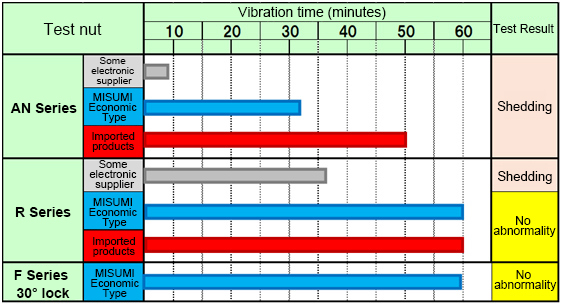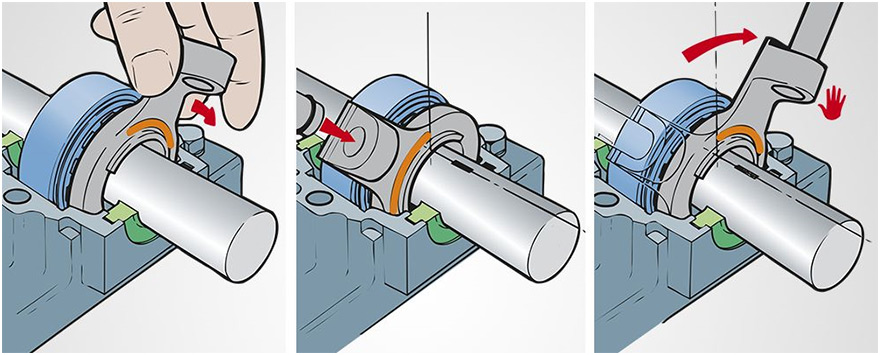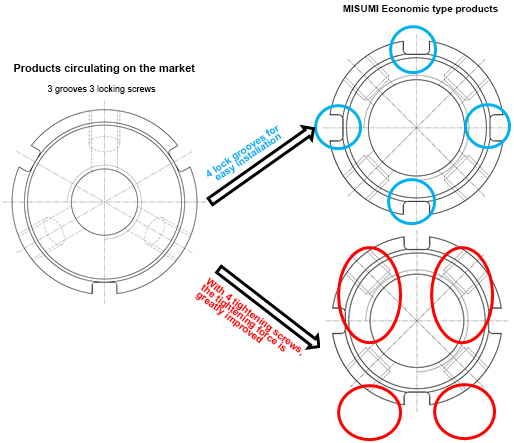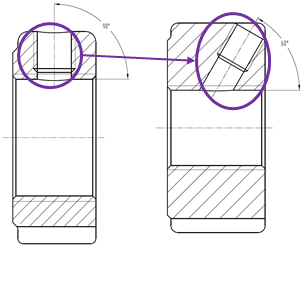(!)Due to Microsoft's end of support for Internet Explorer 11 on 15/06/2022, this site does not support the recommended environment.
50,000 Stock items for Same Day Ship Out.
All Categories
Categories
- Automation Components
A wide variety of standard and configurable components for factory automation engineers in industries such as automotive, semiconductor, packaging, medical and many more.
- Linear Motion
- Rotary Motion
- Connecting Parts
- Rotary Power Transmission
- Motors
- Conveyors & Material Handling
- Locating, Positioning, Jigs & Fixtures
- Inspection
- Sensors, Switches
- Pneumatics, Hydraulics
- Vacuum Components
- Hydraulic Equipment
- Discharging / Painting Devices
- Pipe, Tubes, Hoses & Fittings
- Modules, Units
- Heaters, Temperature Control
- Framing & Support
- Casters, Leveling Mounts, Posts
- Doors, Cabinet Hardware
- Springs, Shock Absorbers
- Adjusting, Fastening, Magnets
- Antivibration, Soundproofing Materials, Safety Products
- Fasteners
A good selection of accessories such as screws, bolts, washers and nuts that you may need for your daily engineering usage.
- Materials
Browse industrial materials ranging from heat insulating plates, sponges, to metal and plastic materials in different sizes to meet your various applications.
- Wiring Components
A wide variety of wiring parts for connecting and protecting control and PC parts including Connectors, Cables, Electric Wires, Crimping Terminals and more.
- LAN Cables / Industrial Network Cables
- Cables by Application
- Cables with Connectors
- RS232 / Personal Computers / AV Cables
- Wires/Cables
- Connectors (General Purpose)
- Crimp Terminals
- Zip Ties
- Cable Glands
- Cable Bushings/Clips/Stickers
- Screws/Spacers
- Cable Accessories
- Tubes
- Protection Tubes
- Ducts/Wiremolds
- General Purpose Tools
- Dedicated Tools
- Soldering Supplies
- Electrical & Controls
A wide variety of controls and PC parts for electrical engineers including Controls, Powers, PC parts and more.
- Cutting Tools
A wide variety of cutting tools for many uses and work materials including End Mills, Drills, Cutters, Reamers, Turning Tools and more.
- Carbide End Mills
- HSS End Mills
- Milling Cutter Inserts/Holders
- Customized Straight Blade End Mills
- Dedicated Cutters
- Turning Tools
- Drill Bits
- Screw-Hole-Related Tools
- Reamers
- Chamfering / Centering Tools
- Fixtures Related to Cutting Tools
- Step Drills
- Hole Saws
- Clean Key Cutters
- Core Drills (Tip Tools)
- Magnetic Drilling Machine Cutters
- Drill Bits for Electric Drilling Machines
- Woodworking Drill Cutters
- Drills for Concrete
- Processing Tools
A wide variety of tools and supplies used in processing including Machine Tools, Measurement Tools, Grinding and Polishing Supplies and more.
- Material Handling & Storage
A wide variety of goods used in shipment, material handling and warehouse including Tape supplies, Stretch film, Truck, Shelf, Crane and more.
- Tape Supplies
- Cushioning Materials
- Stretch Films
- Cardboard
- Plastic Bags
- PP Bands
- Magic Tapes / Tying Belts
- Rubber Bands
- Strings/Ropes
- Cable Ties
- Tags
- Labelers
- Unpacking Cutters
- Packing Support Equipment
- Cloth Sheets for Packing
- Conveyance/Dolly Carts
- Tool Wagons
- Tool Cabinets / Container Racks
- Lifters / Hand Pallets
- Container Pallets
- Storage Supplies
- Shelves/Racks
- Work Benches
- Suspended Clamps/Suspended Belts
- Jack Winches
- Chain Block Cranes
- Bottles/Containers
- Bicycle Storage Area
- Safety & General Supplies
A large variety of goods for every kind of factories and offices including Protection items, Cleaning supplies, sanitations, office supplies and more.
- Lab & Clean Room Supplies
A large variety of items used in R&D and Clean Room including research Equipment, Laboratory Essentials, Analysis Supplies, Clean Environment-Related Equipment and more.
- Press Die Components
Choose from thousands of standard stamping die components including Punch & Die, Gas Springs, Guide Components, Coil Springs and many more.
- Plastic Mold Components
Browse our wide variety of mold components including Ejector Pins, Sleeves, Leader Components, Sprue Bushings and many more.
- Ejector Pins
- Sleeves, Center Pins
- Core Pins
- Sprue bushings, Gates, and other components
- Date Mark Inserts, Recycle Mark Inserts, Pins with Gas Vent
- Undercut, Plates
- Leader Components, Components for Ejector Space
- Mold Opening Controllers
- Cooling or Heating Components
- Accessories, Others
- Components of Large Mold, Die Casting
- Injection Molding Components
Browse our injection molding components including Heating Items, Couplers, Hoses and more.
- Purging Agent
- Injection Molding Machine Products
- Accessories of Equipment
- Auxiliary Equipment
- Air Nippers
- Air Cylinders
- Air Chuck for Runner
- Chuck Board Components
- Frames
- Suction Components
- Parallel Air Chuck
- Special Air Chuck
- Chemical for Injection Molding
- Mold Maintenance
- Heating Items
- Heat Insulation Sheets
- Couplers, Plugs, One-touch Joints
- Tubes, Hoses, Peripheral Components
Search by Application
Brands
- Notice of End of Sales for Economy Series Pneumatic Equipment Category. More information.
- Please note that E-Invoice will be sent to our customers by email. For more information, please read News.
Bearing Lock Nuts F Type 60-degree Clamping (Part Numbers)
- Volume Discount
Part Number
Configured Part Number is shown.
Economy Bearing Lock Nuts F Type 60-degree Clamping
- The Economy Series Bearing Lock Nuts deliver high performance at a budget-friendly price.
- Choose from a broad range of thread sizes for versatility in various applications.
- Made from strong materials with a locking pin, engineered to withstand demanding conditions.
- The clamping design provides a strong grip and stability, managing vibrations.
- Enjoy fast shipping and extensive inventory for timely delivery.


![]()
MISUMI Standard
![]()
Cheaper Price
![]()
Product Variety
![]()
3D CAD Support
Product Overview of Fulcrum Pins
Product Feature of Fulcrum Pins
Features of Fulcrum Pins
In some important occasions we will take some anti-loosening measures to ensure the reliability of nut locking. Fulcrum Pins, Lock Nut is one of the anti-loosening measures.

Fulcrum Pins Locking copper and thread are designed at a 60° angle, and do not bear the axial load on the thread. When the nut is locked, the thread surface will not relieve the axial load
Dimensional Drawing of Fulcrum Pins

Specifications Overview of Fulcrum Pins

Fulcrum Pins, Axial vibration shock test result (Vibration frequency: 0.6cpm, acceleration: 8G)

Example Use of Fulcrum Pins

Part Number
CAD Data download and 3D preview are not available because the part number has not yet been determined.
- *In order to open the CAD Data download and 3D preview screen, the part number must be fixed.
- Please confirm the part number from "Specification / Dimension"on the left side, and then perform the CAD Data Download / 3D Preview operation.
| Part Number |
|---|
| C-FM12 |
| C-FM15 |
| C-FM17 |
| C-FM20 |
| C-FM20-1 |
| C-FM24 |
| C-FM25 |
| C-FM30 |
| C-FM35 |
| C-FM40 |
| C-FM45 |
| C-FM50 |
| C-FM55 |
| C-FM60 |
| Part Number | Standard Unit Price | Minimum order quantity | Volume Discount | Days to Ship | Nominal of Thread M |
|---|---|---|---|---|---|
MYR 21.97 | 2 Piece(s) | Available | 12 Day(s) | M12X1.5 | |
MYR 21.97 | 1 Piece(s) | Available | 1 Day(s) | M15X1.0 | |
MYR 20.71 | 1 Piece(s) | Available | 5 Day(s) | M17X1.0 | |
MYR 22.71 | 1 Piece(s) | Available | 1 Day(s) | M20X1.0 | |
MYR 22.71 | 1 Piece(s) | Available | 1 Day(s) | M20X1.5 | |
MYR 24.25 | 2 Piece(s) | Available | 12 Day(s) | M24X1.5 | |
MYR 24.25 | 2 Piece(s) | Available | 12 Day(s) | M25X1.5 | |
MYR 26.35 | 2 Piece(s) | Available | 12 Day(s) | M30X1.5 | |
MYR 29.56 | 1 Piece(s) | Available | 1 Day(s) | M35X1.5 | |
MYR 32.81 | 2 Piece(s) | Available | 12 Day(s) | M40X1.5 | |
MYR 37.66 | 2 Piece(s) | Available | 12 Day(s) | M45X1.5 | |
MYR 43.13 | 1 Piece(s) | Available | 1 Day(s) | M50X1.5 | |
MYR 51.09 | 2 Piece(s) | Available | 12 Day(s) | M55X2.0 | |
MYR 54.65 | 1 Piece(s) | Available | 1 Day(s) | M60X2.0 |
Loading...
Basic Information
| Type | Lock Nut | Shape | Round Shape | Material | S45C Thermal Refined |
|---|---|---|---|---|---|
| Surface Treatment | Phosphate Conversion Coating | Screw Type | Metric (Fine) Thread |
- The specifications and dimensions of some parts may not be fully covered. For exact details, refer to manufacturer catalogs .
Frequently asked question (FAQ)
- Question: Does the lock nut need to be greased?
- Answer: Lubricant is required for both tightening and loosening. If the hardness of the fixed shaft is relatively low, please use a grease with high lubricity.
- Question: Precautions when fixing
- Answer: In order to ensure the maximum effect of the lock nut, please expose at least 2 inches of the threaded part when fixing. Standard type lock nut is a round nut, with four small slots around its outer perimeter, which can be tightened on the stud body using a crescent wrench. The lock nut should be equipped with a shaft washer, which allows the small slot on the stud body to be fixed relative to its peripheral small slot, preventing its loosening.
- Question: Differences between a standard nut and a lock nut (1)
-
Answer:
1. Vibration resistance is not the same
Standard nut: inferior relative to the lock nut
Lock nut: superior anti-vibration performance. When the thread is tightened, the top of thread of the bolt closely enters the 30° wedge-shaped slope of the nut to be clamped, and the normal force exerted on the wedge-shaped slope forms an angle of 60° with the axis of the bolt instead of The included angle of 30°. Therefore, the normal force generated when the locknut is tightened is much greater than that of the standard nut, and it has a great anti-loosening and anti-vibration ability. - Question: Differences between a standard nut and a lock nut (2)
-
Answer:
2. Wear resistance and shear resistance are not the same
Standard nut: poor abrasion resistance and shear resistance;
Lock nut: excellent wear resistance and shear resistance. The 30° inclined surface of thread bottom of the nut can make the nut locking force evenly distributed on all the threads of each ridge. Since the compression force on the thread surface of each ridge is evenly distributed, the nut can better solve the thread wear and shear deformation problem. - Question: Differences between a standard nut and a lock nut (3)
-
Answer:
3. The reutilization rate is not the same
Standard nut: low reutilization rate;
Lock nut: high reutilization rate. Extensive use shows that after repeated tightening and disassembly of the anti-loosening nut, its locking force is still not reduced, and the original locking can be maintained.







How can we improve?
How can we improve?
While we are not able to respond directly to comments submitted in this form, the information will be reviewed for future improvement.
Customer Privacy Policy
Thank you for your cooperation.
While we are not able to respond directly to comments submitted in this form, the information will be reviewed for future improvement.
Please use the inquiry form.
Customer Privacy Policy